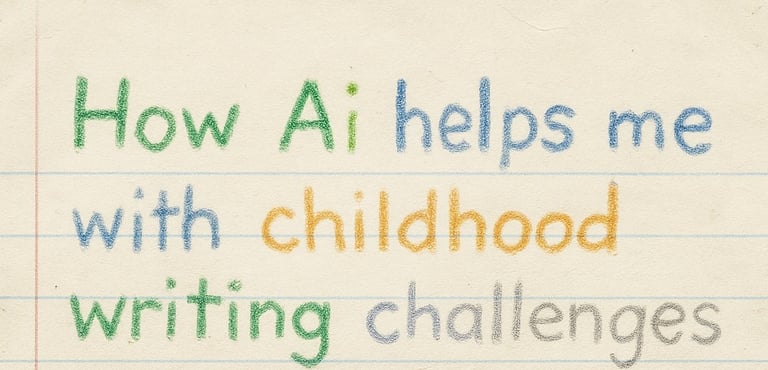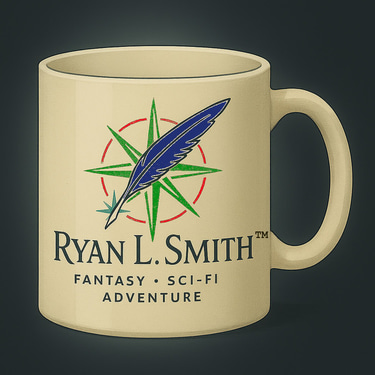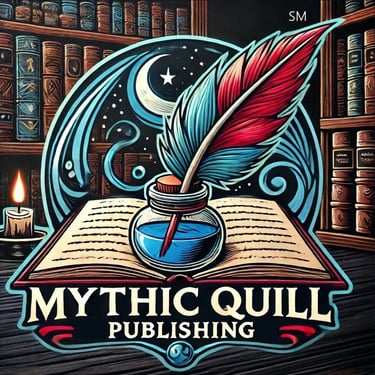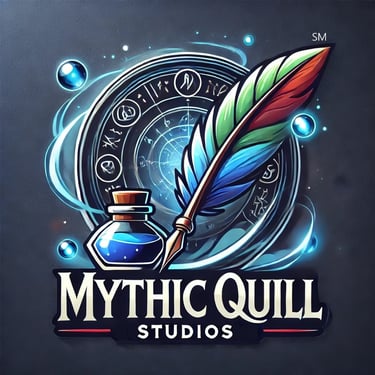Welcome To The Official Author Site of Ryan L. Smith
The Curious Worlds of Ryan L. Smith™
How AI Helps Me with Childhood Writing “Challenges”, Not “Disabilities”
From blurry vision and messy notebooks to clear words on a page, my journey hasn’t been easy. But with AI as a tool, I’ve discovered new ways to write, create, and keep pushing past challenges.
DISCUSSIONS
Ryan L Smith
8/17/20255 min read
How AI Helps Me with Childhood Writing “Challenges,” Not “Disabilities”
Before I get into how AI helps me write better, let me assure you—this will all come together in the end. But first, some backstory. I know I said “little blog,” but buckle up, buttercup. This is a cup-of-tea kind of post. 😊
Why I Say “Challenges,” Not “Disabilities”
The word disability has always felt heavy to me. It gets used too often, and it carries a weight that doesn’t really fit the person actually living with the challenge.
This is especially true when labels like “learning disability” get thrown around. Even when a child is surrounded by love and support, that word plants something deep in their psyche—this idea that they’re not normal, or somehow less valuable. And once you believe you’re “not normal,” it sticks.
A challenge, on the other hand, is exactly that—a challenge. And challenges can be overcome, conquered, broken through. The word disability feels permanent, oppressive, like a cage you can never escape. But that’s simply not true.
As a kid, I faced plenty: severe vision impairments, hyperactive ADD, moderate dyslexia, and the ripple effects of all of them stacked together. These didn’t disable me. They limited my potential until I got the right help.
I spent what felt like endless hours at Children’s Hospital eye clinics and support centers, doing everything I could to keep up while other kids were just being kids. At one point, I nearly died from a blood condition caused by Ritalin—something the doctors barely caught in time. Without them, I wouldn’t be here writing this today.
In the early 80s, awareness around vision and learning challenges was just beginning to grow. I credit my parents, and the doctors at Children’s Hospital of Cincinnati, for carrying me and my brother through those years.
A World Through a Fuzzy Lens
Imagine your whole world always looking fuzzy and yellow. No sharp outlines. No bright colors. Just haze.
That was my reality until I was about six years old and got my first pair of glasses. Even then, it wasn’t clear. It wasn’t until I was seventeen—after cataract surgery and lens implants—that I finally saw the world the way most people had been seeing it all along. For the first time, I saw life and color in a way that felt brand new.
I was born with congenital cataracts. Not unheard of, but not well understood back then. Since those days, medicine has made leaps. My brother and my son both had the same condition—only theirs were so severe that doctors had to remove their eye lenses before they were even 18 months old.
I never fully understood what my parents went through until my wife and I faced the same diagnosis with our son. The fear. The hope. The uncertainty. It all came crashing in while sitting in that doctor’s office, hearing: “Your baby is essentially blind unless we act. And even with surgery, he’ll still be partially blind without corrective lenses, and at high risk for childhood ocular hypertension—which, as we’ve since learned, we didn’t escape.”
It’s like looking underwater—you can see vague shapes and colors, but no detail. That was my son’s world. That was my world. That was my brother’s world, too, for a time.
And here’s the thing: we never used the word disability. Because to us, it was something to overcome, to accept, and to keep pushing through—like a glass ceiling waiting for the right swing of a hammer.
If you hand me a hammer and tell me, “Bust down that wall, it’s a challenge,” I’ll take a swing. But if you hand me the same hammer and tell me, “Don’t bother, the hammer is broken, it has a disability,” I probably won’t even try—because the outcome feels set before I even start.
That’s the crutch of the word disability. It steals the fight before it begins.
For me, cataracts plus farsightedness meant growing up in a constant blur. Surgery wasn’t an option because of the risks, so I just had to live with it. And that blurry start didn’t stand alone—it stacked right on top of my dyslexia, turning reading and writing into something that felt like climbing a mountain with no ropes.
It wasn’t until 4th or 5th grade—and honestly, a few years beyond—that I finally started to catch up. The truth is, I only made it that far because my parents were absolute superheroes. They refused to give up on me. They kept pushing, kept believing I could do it—even in the moments when I didn’t believe it myself.
Maybe you’ve got your own version of blurry notebooks, skipped words, or invisible hurdles. Maybe it’s not dyslexia at all, but something that makes you feel behind. What I’ve learned is—tools matter. Support matters. And mindset matters most of all.
Enter AI: My “Second Brain”
So, how does AI help me now?
It acts as my second brain.
Even after years of improving and grinding it out without AI—after a career in IT filled with technical writing, and all those late nights dreaming up fantasy shorts, D&D modules, wild adventure hooks, and half-baked sci-fi concepts—I still trip over the same old challenges.
Moderate dyslexia means my brain just skips things. Whole words vanish. Letters flip. Sentences trail off—and I don’t even notice until somebody else points it out. Back in the day, spellcheck in Microsoft Word felt like a miracle. It wasn’t perfect, but it gave me a way to catch things I could never see on my own. AI takes that same idea and pushes it even further.
Now I can feed my writing into AI and say, “Pretend you’re my English teacher. Show me what’s missing or wrong.” And it does exactly that—it shows me the gaps without rewriting my voice. That’s the key.
Instead of rereading every line five times, I can focus on the story I want to tell and let AI catch the mistakes my brain will never see. That shift has been nothing short of life-changing.
Why It Matters
Tools like AI don’t erase the challenges—they make them manageable. They give people like me the chance to keep creating, to keep thriving, and to tell stories without drowning in the mechanics of writing. If I’d had this as a kid, I can’t even begin to imagine how different my path might have been.
We really do live in a sci-fi age. When I was growing up, Atari was cutting-edge and the family phone hung on the wall in the kitchen with a cord you could get tangled in. Now kids carry both in the palm of their hand. How sci-fi is that?!
It’s both scary and awesome. But deep down, I believe in the good of humanity—that with love, morals, and faith, we’ll be okay.
I only wish I could see what humankind will achieve hundreds of years from now. Will we have a real-life Star Trek? Moon colonies? Interstellar travel? Whole generations growing up among the stars?
I hope so. Because the alternative—a humanity that destroys itself or collapses inward—isn’t something I want for our kids. And as long as we keep pushing forward, breaking challenges instead of bowing to them, I believe the future can be brighter than anything we’ve imagined.
So in closing—if you know someone, are someone, or care for someone the world labels with a “disability,” flip the script. Call it a challenge. Take a swing at that glass ceiling.
I know there are some challenges so devastating that they can’t be fully overcome, and sometimes it is what it is. But that person living it doesn’t need to carry the extra weight of a word that tells them they’re less. Believe me—they already know the struggle. And that breaks my heart into pieces, because as modern as our society is, we’re still not there yet.
But don’t let that stop you—or them—from trying.




